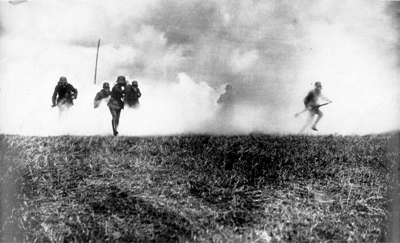It was gas – 5,730 cylinders of it. French and Algerian soldiers, retching and panicked, ran off, leaving a four-mile gap for the Germans to attack unimpeded. However, the Germans, wary of stepping into the cloud protected only by their crude gasmasks, felt unable to exploit the opportunity. This new terrible weapon was inhumane, cried the Allied generals, only to be using it themselves within five months.

Gas attack, c. 1916
Deutsches Bundesarchiv, Bild 183-R05923
Gas had been used three months before on the Eastern Front but in the freezing temperatures the chemicals froze and failed to vaporize. Having experimented with chlorine, Fritz Haber, pioneer of gas warfare, developed a new, more effective gas, called phosgene, which omitted a smell akin to freshly cut hay. Its first use, again on the Eastern Front, in January 1916, proved successful. Haber and his associates celebrated. Haber’s wife, appalled by her husband’s barbarous innovation, took his service revolver and shot herself.
In 1917, the Germans introduced mustard gas, so named because of its odour, which could penetrate clothing and be absorbed through skin. Gas had become a common feature by the end of the war. Although it was effective at incapacitating troops and causing long-term illness, gas accounted for only 3 per cent of fatalities. Another German invention, the flamethrower, was introduced into battle against the French in February 1915. But it was the artillery that caused by far the most damage throughout the war.
Following Kitchener’s recruitment drive, the British army now had the men but lacked the crucial equipment: weapons, ammunition, clothing, and even accommodation were all lacking. Following British failure at the Battle of Aubers Bridge in May 1915, the British commander-in-chief, Sir John French, leaked the want of ammunition to The Times, which picked up the story, blaming the Liberal government of Lord Asquith. Politically, the ‘Shell Scandal’ proved fatal. The Liberal government was forced into a coalition with the Conservatives. Herbert Asquith remained prime minister, but weakened, he survived for only another nineteen months.
In September 1915, at the Battle of Loos, Britain first used gas – 140 tons. But the wind made a mockery of General Douglas Haig’s plans, and over 2,000 British suffered as the gas floated back towards British lines, although only seven died as a consequence. After a month of futile attack at the cost of some 50,000 British lives, the offensive was called off, finishing on 14 October. Haig may have been commander on the field, but it was Sir John French, as commander-in-chief, who fell. In December French was replaced by Haig.
Gallipoli
In October 1914, Turkey (the Ottoman Empire) entered the war on the side of the Central Powers and on Christmas Day went on the offensive against the Russians, launching an attack through the Caucasus. The Tsar sent an appeal to Britain, asking for a diversionary attack that would ease the pressure on Russia. In the event, the Turks failed miserably in its first campaign in Russia, losing 70 per cent, dead or wounded, of an army estimated to be at least 100,000 strong. Enver Pasha blamed Turkey’s defeat on Armenian deserters who had gone over to the Russian side. Retribution was brutal, resulting in the Armenian massacre, sometimes considered the first genocide, in which Armenians were deported to Syria. Famine, disease and murder resulted in one to two million Armenian deaths.
The British pressed on with its plan for a diversionary attack, to use the Royal Navy to take control of the Dardanelles Straits from where they could attack Constantinople, the Ottoman capital. The Dardanelles, a strait of water separating mainland Turkey and the Gallipoli peninsula, is 60 miles long and, at its widest, only 3.5 miles. Britain’s First Lord of the Admiralty, Winston Churchill, insisted that the Royal Navy, acting alone, could succeed. On 19 February, a flotilla of British and French ships pounded the outer forts of the Dardanelles and a month later attempted to penetrate the strait. It failed, losing six ships, half its fleet.
1 comment